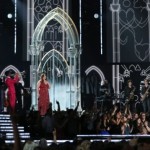Music at Mars Hill is a weekly column by Luke Larsen that seeks to find God amidst the newest trends in both mainstream music and independent music.
I previously wrote a bit of a rant here on Music at Mars Hill on why Coldplay was moving closer and closer to populist ambiguity when they released their EP leading up to Mylo Xyloto. And now that we’ve got the full album, there’s been a lot of talk about the thing (as is to be expected in a Coldplay release). A recent article over at ThinkChristian talks about how the album is a love-story of sorts and should inspire Christians to be vulnerable and willingly offer ourselves to others.
I recently tried out a new church close to where I recently moved. Each week I’ve gone, Coldplay’s Mylo Xyloto has consistently been the music playing in the background before the service started. While it’s important to remember that the meeting is a twentysomethings-oriented group, I’ll admit that there is something fitting about the sounds of Chris Martin and company blasting through the church speakers. To many, particularly young Christians, albums like Viva La Vida and Mylo Xyloto have become the new go-to for those who have moved on past the shrinking pool that is CCM (Contemporary Christian Music). Despite the fact that Chris Martin is a self-proclaimed “Alltheist” (a made-up term meaning that he believes everything), when he sings about paradise, heaven, and being an inheritor of a kingdom, Christians have been singing along. But what is it about Coldplay, especially in their past two albums, that rings so true with Christians?
The more I listened to Mylo Xyloto, the more I began to see that Coldplay was picking up on many of the same things CCM had been emphasizing for so long. Pitchfork recently published a fascinating feature on why “Big Music,” or epic stadium-sized rock, has taken the rhetoric of Christianity and spirituality to make something accessible to our secularized culture:
“When I see religious art, I tend to admire it but not connect with it on any gut emotional level. As an atheist, I see a stained-glass apocalypse, and I can coolly reconstruct the awe, excitement, and fear that might have bubbled up in the medieval mind. But I can’t feel it. And the same—for all its beauty—goes for gospel. But the Big Music—deploying the emotion of religion within an aesthetic I do relate to—can sometimes push buttons I don’t necessarily want pushed. At its frequent worst, it triggers the same disgusted flight-impulse a TV preacher might. At its rare best, though, it makes me want to believe.”
In other words, when you hear artists like Florence + The Machine or Coldplay reference Christian themes or act as “Big Music,” they definitely are not doing it to pander to Christians. Instead, in the same way they use references to other genres, they are using that same rhetoric to achieve a parallel spiritual/musical experience for people that would otherwise rejects such notions. There is a reason Coldplay chose the nonsensical word “Mylo Xyloto” for the name of their new album; its literal meaning is left empty to emphasize the grandness of its scope that all people can relate to. For us as Christians, it’s okay for us to let Coldplay and other “Big Music” point us to the grand, epic, and massive thing it is imitating.











